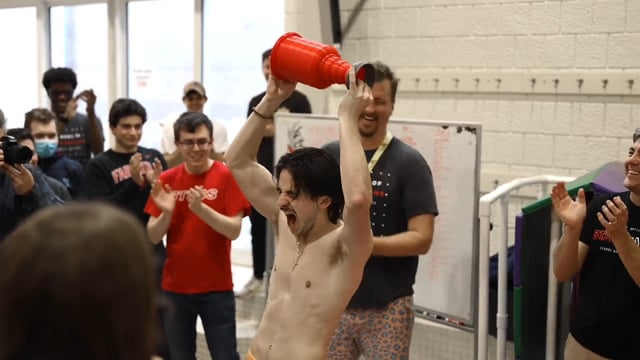
Sixteen teams of first-year engineering students used their engineering skills and knowledge from their “Fundamentals of Engineering” course to design, build, and race buoyant contraptions that allowed them to "walk on water." The competition was judged by engineering professors John Drazan, PhD; Elif Kongar, PhD; Isaac Macwan, PhD; and Gigi Belfadel, PhD.
Following an intense competition, Max Topol, Myles Gorski, Will Henderson, Conor Creighton, Liam Gelston took home “Best Engineering Design” while Charlotte Savigny ’26, Kayleigh Chin’26, and Sarah Dorgan ’26 were awarded the “People’s Choice Award.”
For their design, Savigny, Chin, and Dorgan analyzed the buoyancy and movement of boats. Using this knowledge, they used foam with a similar consistency to a boogie board that attached to a PVC pipe to act as a flotation device. For extra support, the team added buckets to the bottom for stabilization. They also designed foam foot boards that were encased to allow them to propel through the water.
“This experience has taught us many helpful tips regarding different design processes and how to make alterations in order to take our original ideas and make them better. We have used problem-solving skills to determine which design would be the most efficient for our project, while also keeping within the various constraints we were given,” said Savigny.
The team also noted that “through this process, we are taught to think critically about how to create a structure that is stable, buoyant, able to cut through water efficiently, and strong enough to sustain an operator.”
New this year, student teams will incorporate a service-learning element to the annual event by engaging with Wakeman Boys & Girls Club members prior to the competition. ÐÓ°ÉÔ°æ undergraduate engineers presented their design processes to the visiting students at the School of Engineering's new state-of-the-art Innovation Annex, before heading to the RecPlex to put their creations to the test.
“This experience builds confidence in the first-year students and allows them to practice their communication skills in an environment in which they are also serving as role models and mentors,” said Dr. Kongar. “This service-learning opportunity is replicable for other engineering programs seeking to improve student communication skills and will help build a more robust pipeline of young students into the engineering professions.”




